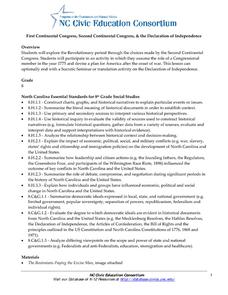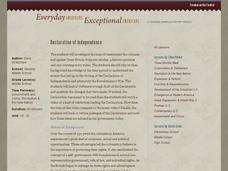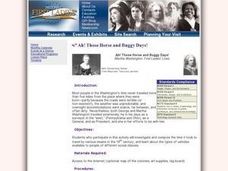National Endowment for the Humanities
The "To Do List" of the Continental Congress
What is on your to-do list today? The second lesson of a three-part series on Lost Heroes of America investigates the laundry list of items in front of the second Continental Congress. Scholars research, analyze, and present information...
Carolina K-12
First Continental Congress, Second Continental Congress, and the Declaration of Independence
Your learners will take on the roles of Congressional members in the year 1775 and devise a plan for America after the onset of the Revolutionary War.
Curated OER
The War in the North, 1775-1778
High schoolers investigate the hardships and difficulties that the Continental army faced in the early years of the American War for independence. the battles of Lexington and concord and the expectations of the Continental Army forms...
North Carolina Consortium for Middle East Studies
Federalists v. Anti‐Federalists
Here is a solid lesson plan to support your instruction on the Continental Congress and the Articles of Confederation. It includes close analysis of primary source images, a guided notes template and answer key, and many key points to...
US House of Representatives
Hispanic Congressional Representation in the Era of U.S. Continental Expansion, 1822–1898
New ReviewFrom the Louisiana Purchase to the Spanish-American War, the history of the United States is intertwined with the story of Hispanic Americans. Using an article about Hispanics in Congress during the 1800s, learners research their lives...
National Endowment for the Humanities
Lost Hero: Was John Hanson Actually the First President?
The first president of the United States was ... John Hanson? Scholars investigate the notion that the initial leader of the nation was not George Washington. Using research, articles, and open discussion, individuals create a quest for...
Smithsonian Institution
Who's in Camp?
Pupils complete readings, a group activity using cards, and a writing activity to better understand people's lives during the American Revolution. The resource emphasizes people such as the militiamen, women, officers, and children,...
Smithsonian Institution
General George Washington, Military Leader
Teach pupils the characteristics that make George Washington such an effective leader, especially in context of his time period. Scholars view artifacts, participate in group work, create lists, compare and contrast, and discuss as a...
Curated OER
Weaknesses of the Articles of Confederation
Sixth graders explore the weaknesses of the Articles of Confederation. In this history lesson, 6th graders consider the problems created when each colony had independent currencies. Students problem solve other related weaknesses.
Los Angeles Unified School District
Why Is the Declaration of Independence Important?
Fair or unfair? To begin a study of the American Revolution, class members review the treatment of the people of the American Colonies by the King of England and decide which were fair and which were unfair. Class members then annotate a...
Carolina K-12
Causes of the American Revolution
Beginning with the experience of hearing that lockers in school will be taxed, through analysis of political cartoons and informational text, and culminating in a debate between loyalists and patriots, your class members will engage in a...
Carolina K-12
On the Road to Revolution: Creating a Living Timeline
Divided into nine topic groups, from the Proclamation of 1763 to the Battles of Lexington and Concord, your young historians research significant events on the road to the American Revolution, then create a two- to three-minute sketch...
Curated OER
The Revolutionary War: The Battle For Freedom
Eighth graders examine the events leading up to the Revolutionary War with a focus on the Boston Tea Party. Using the internet, they discover why the tea was dropped into the harbor by the colonists and research the Intolerable Acts. ...
Curated OER
In Congress Assembled: Continuity and Change in the Governing of the United States
Students interpret history using primary resources and secondary research. The Constitution is examined and changes are explained within the time period they were made.
Curated OER
Drafting the Declaration of Independence
Students working in small groups to compare and contrast the rough draft of the Declaration of Independence written by Thomas Jefferson with the final version. They list the differences and decide on why the changes were made.
Film English
World Builder
If you could build your own world from the ground up, what would you include? Ask your pupils this question, and have them write about their worlds and share with partners. Then, show the short film, which includes some impressive world...
National Endowment for the Humanities
Starting a Government from Scratch
Young historians have an opportunity to experience the challenges of starting a new government. After watching a short video about the Articles of Confederation, class members generate a "to-do list" of actions that a new government...
Roy Rosenzweig Center for History and New Media
Declaration of Independence
Give budding historians a guided exploration of the Declaration of Independence, historic photos, videos, and more as they deepen their understanding of the American Revolution and the attitude of the colonists leading up to the war.
National Endowment for the Humanities
The War in the North, 1775–1778
Using primary source documents, including maps, learners examine Revolutionary War events from 1775 to 1778. The focus here is on the challenges George Washington and the Continental army faced and how they persevered in spite of those...
Curated OER
Recap and Activities (Reveloutionary War Era)
Eighth graders discuss the importance of the Second Continental Congress. They compare and contrast present-day athletic mascots and their roots in the Revolutionary War. After discussing Loyalists and Patriots, 8th graders write...
Curated OER
Early Congress Proclaims Holidays
Students read about and discuss the historical effects of Congressional decision-making in the establishment of national holidays.
Curated OER
ROAD TO REVOLUTION
Students explain how England's Glorious Revolution affected the colonies and investigate how the Great Awakening and Enlightenment affected the colonies. Students determine how the outcome of the French and Indian war affected N. America...
National First Ladies' Library
Ah! Those Horse and Buggy Days!
Students discuss contemporary methods of travel and the time it takes to travel to places. They use the Internet to explore 18th century travel. Students work in small group to research the amount of time it would have taken...
Global Oneness Project
Repairing the Fabric of Democracy
During elections, headlines constantly lament the issue of low voter turnout. Help class members understand why this is such an important topic with relevant articles, a discussion of both sides of the issue, and a reflective essay.

























